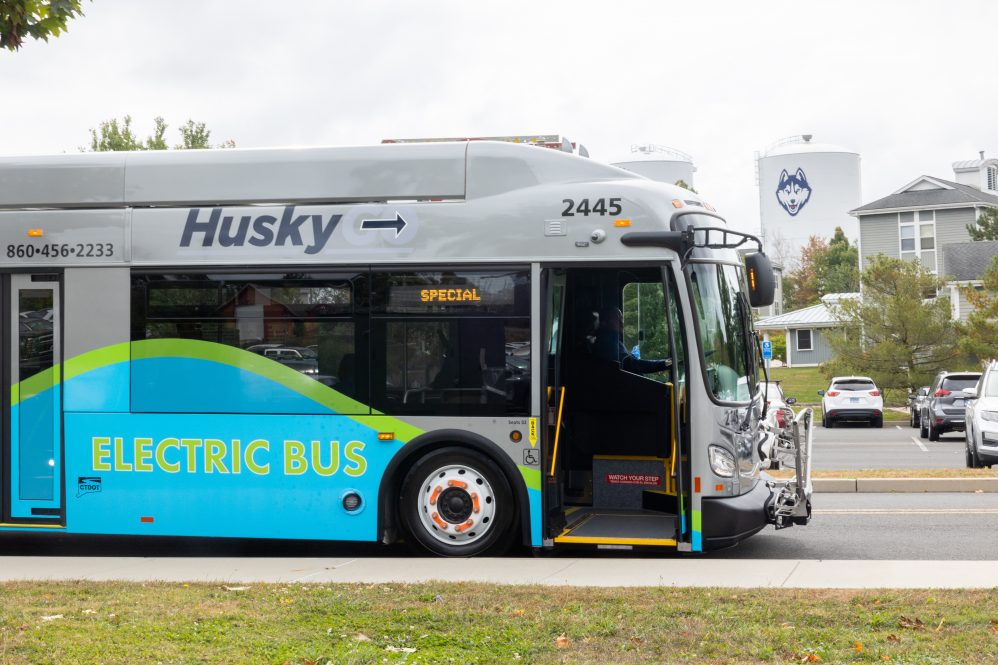'UConn has operated buses of various kinds at Storrs for about 100 years, but this will be the first time they're run without fossil fuels'

A HuskyGo electric bus-the first of its kind in its fleet-sits next to the bus stops in the W Lot on Sept. 23, 2024. More electric buses are joining the fleet this fall. (Sydney Herdle/UConn Photo)
UConn's progress toward achieving on-campus climate neutrality by 2030 is being bolstered by the addition of two new electric buses, the first zero-emission models since buses started circulating at Storrs nearly 100 years ago.
Officials from UConn, the Connecticut Department of Transportation, and the Windham Region Transit District (WRTD) cut the ribbon Monday on one of the new buses with state Sen. Mae Flexer and state Rep. Greg Haddad, both of whom are UConn alums whose districts include Storrs.
The two new electric buses were previewed on campus in fall 2024, and are joining the fleet this month now that the charging infrastructure is ready for use at the WRTD garage.
WRTD, which operates UConn's bus system, is among transit providers working with CTDOT and the state Department of Energy & Environmental Protection (DEEP) on an initiative to transition from diesel to zero-emission models under Gov. Ned Lamont's 2021 executive order.
The new electric buses at UConn are among 61 currently operating throughout the state. CTtransit plans to add 20 more in the next year, with others to come at transit districts throughout the state, said Benjamin Limmer, bureau chief of CTDOT's Bureau of Public Transportation.
Currently, buses are responsible for 40% of the state's carbon emissions, he told guests at Monday's event.
"Replacing diesel buses with these new electric buses will cut emissions from each of their trips … We look forward to the positive impact that they will have on all of our communities: cleaner air, quieter streets, and better rides. These are just a few of the benefits we expect to see," Limmer said.
The two new zero-emission electric buses at UConn can run for about 150 to 180 miles per charge in winter, and about 200 to 220 miles per charge in summer. They also have all of the amenities needed for a comfortable and productive ride, including phone charging ports, comfortable silica cushion seats, electronic information displays, three-position bike racks, and other features.
"We're not just investing in new buses; we're investing in cleaner air, smarter infrastructure, and better service," said Tracie Orcillez, WRTD's interim executive director. "For the students, faculty, and visitors who rely on campus transit every day, the change will be seamless, but the impact is lasting."
The addition of the buses marks a milestone in the state's work to advance the use of clean energy in public transportation, and an important step in UConn's work toward achieving climate neutrality on its campuses by 2030 and net carbon zero by 2040.
"UConn has operated buses of various kinds at Storrs for about 100 years, but this will be the first time they're run without fossil fuels, and that's really something to celebrate," says Andy Kelly, UConn's associate director of logistics in charge of parking and transportation services.
He noted that UConn students, who return in the next few weeks for the fall semester, are particularly committed to sustainability and he predicted that they will be pleased to see and ride the new zero-emissions buses.
"Our students care deeply about the environment, both here on campus and more broadly in society," Kelly said. "With their help, we've drastically reduced water and energy use at UConn, cut food waste, increased recycling, and launched some really innovative programs being copied by other universities."
Although most students don't return to campus until next week, their impact was on the minds of all who spoke at Monday's event.
"I want to thank the students who have consistently held the university to a high standard in making sure UConn is leading the country in doing everything we can to combat climate change - and this bus behind us is real evidence of that effort," Flexer said as she stood near the UConn-branded bus on Hillside Road on Monday.
Haddad shared similar sentiments: "When you have as many students who live in your district as I have, you come to understand what the priorities are for the next generation," he said. "Fighting climate change is a top priority for them, which is why I know they are going to be so pleased to see these changes coming to this campus."






